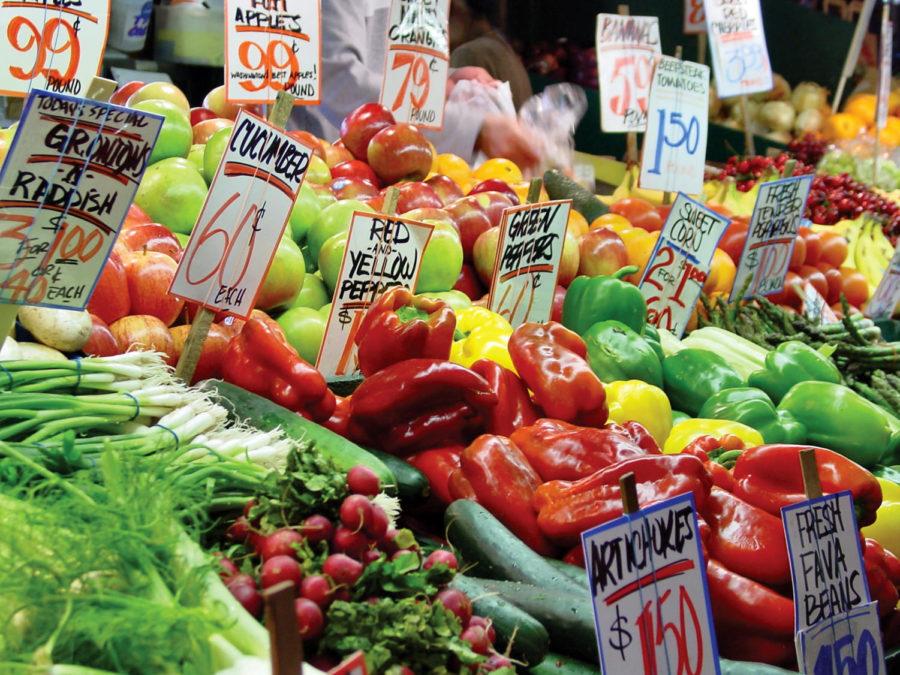Garcia-Merritt: Food sovereignty promotes decision making, independence
Opinion: Garcia 10/22
October 22, 2012
On Monday in the Sun Room of the Memorial Union, George Naylor, Iowa farmer and former president of the National Family Farm Coalition, delivered the 2012 Food Sovereignty Prize to Jeomok Bak and Junkyoung Lee, representatives of the Korean Women Peasant’s Association. The award was given for their work in native seed preservation, community linking, and activism. Following the presentation of the prize, a panel consisting of Naylor, Bak and Tristan Quinn-Thibodeau, of the NGO WhyHunger answered questions from attendees, following an exposition about the importance of food sovereignty across the world.
According to the website of the Food Sovereignty Prize, food sovereignty is a “bottom up” approach that best serves the common people, whose livelihoods depend on their production of crops. It is meant to do more than simply ensure access to food but, rather, the use of food production as a means of exercising free choice. Likewise, FamilyFarms.org explains that food sovereignty is based on “common-sense” principles that are more sustainable, empowering and culturally integrated in the communities where it is exercised.
This would entail a shift in the status quo, effectively promoting forms of subsistence farming, as opposed to agricultural operations that do not necessarily have the local community’s best interests in mind, and which have been historically supported by the World Bank, International Monetary Fund or the World Trade Organization, and other organisms through development aid that promotes industrialization of agriculture.
When speaking at the award ceremony, Quinn-Thibodeau pointed out that while the concept of “Food Security” (the availability of food to populations around the world) exists in many places, food sovereignty does not. He points out that 1 billion people across the world don’t get enough food, another 1 billion have food but don’t get enough micronutrients, and that yet another 1 billion receive both food and micronutrients, but the food they receive is unhealthy and is associated with various diseases. Of these approximately 3 billion people, half are farmers, and half of those are rural workers. Quinn-Thibodeau argues that food sovereignty would alleviate this burden on many of the people which suffer the conditions he described.
So, is food sovereignty possible in American communities? Naylor believes it is “more people around the world work [in agriculture] in cooperatives than in corporations.” The groundwork for food sovereignty exists (in the form of cooperative groups, seed saving, and other forms of traditional or “alternative” agriculture), according to him, and we (as individuals and communities), simply need to shift the existing mindsets away from creating massive amounts of single crops, towards a more diversified agricultural base. Further, Naylor contends that food sovereignty promotes democracy, as it strives to empower citizens to make important decisions regarding food production, and could lead to increased community ties and political involvement from communities that might otherwise not be as politically organized.
Food sovereignty is a reaction to unfair or poorly executed (even with the best intentions, unintended consequences exist for any action) industrialized farming practices, such as monoculture, large scale greenhouse operations and genetically modified seeds for increased yields, among others. It stands as a promotion of sustainable and socially just farming and policy that would be beneficial to farmers, their families and their communities. Choosing the crops they grow instead of being left no alternative but to implement methods of farming that are foreign, expensive and in many cases unnecessary, would alleviate economic and work burdens that are consequences of the importation of methods and crops that are alien to the regions they inhabit.
Food sovereignty would enable someone in Colombia or Ethiopia, to have a sense of purpose; their land would be farmed in the ways that they deem most appropriate. Using the methods they know, with crops they are familiar with, they might be able to produce enough to feed their families or to sell to someone in the cities of their nation. This would be their choice, and they would pursue it, rather than being given no resort but to farm in a manner that is said to be the best.
The main questions that food sovereignty seems to present is: “Who says that the current methods of agriculture are the best? Who are they really the best for?” By empowering local communities to choose their futures, it gives a sense of control, a sense of hope and the skills to implement lasting change for the future. A future where a farmer will be able to continue farming the crops that their parents or grandparents might have farmed. Or not; the choice would be theirs, because food sovereignty would have enabled them to decide for themselves instead of forcing them out of necessity to go in one direction or another.

















